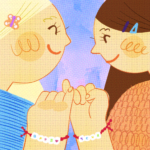
Developing a sense of self while entering adulthood
Who am I? What do I want to do with my life? Am I going down the right path?
These are just a few of the questions a young person might ask themselves when they are searching for their identity or sense of self. In late teens and early 20s, people are left up to their own devices for the first time and are responsible for the decisions they make about their lives.
Mary Charron, a clinical social worker and therapist who specializes in childhood and adolescent mental health says, “It’s kind of like we were going down this waterslide that was really predictable our whole lives, we knew the environment and then you are suddenly spat out into this wave pool and now you have to navigate it on your own and it’s incredibly overwhelming.”
A study done by Developmental Psychology titled Young adult identities and their pathways, says, “During this period of life, young people experience rapid changes at the time they are acquiring autonomy and building a sense of self.”
Young people are looking to gain autonomy by separating from their parents and looking to their social surroundings, hobbies and interests as a way to develop one’s identity.
“They may still be living at home and there’s conflict because they’re trying to be independent and sometimes parents don’t realize that’s a natural part of ‘you’re doing a good job mom and dad, this is how it’s supposed to be.’” Charron says.
This is also a time when young people are moving away from their support systems and may experience anxiety and depression during this time. “This young person is now living miles away from where they grew up, they don’t have any of their friends with them, they don’t have their family, they are living in these dorms and expected to perform well in school,” Charron says. “The amount of environmental pressures sometimes can be that one thing that just pushes someone right over the edge.”
Katie Van Landschoot, 25, experienced an identity crisis when she was studying in university and again when she became a young mother.
“When I was 22 in university, I felt like I was losing my grip on reality. I would go into these headspaces like, ‘Am I even real?’ ‘Is life even real?’” Van Landschoot says. “But at the time I was in a bad relationship, I was smoking a lot of weed and doing party drugs. Obviously that plays a large factor as well in mental health.”
When a young person is battling with an identity crisis, they may be more at risk to these harmful behaviours.
“I think those situations kind of create a perfect storm,” Charron says. “When we don’t know who we are it causes us to be quite vulnerable which means that we are more susceptible to negative coping strategies such as drugs and alcohol or abusive relationships.”
Charron also says that young people might engage in destructive activities to try and fit in or feel validated. “We want people to like us because we may not fully like ourselves.”
Van Landschoot eventually found herself in a better place, feeling healthier and happier. But when she found out she was pregnant, she began to have troubles with her sense of self again. “It was a huge shift in my life, it was insane to think I, this 23-year-old who had all these goals and aspirations, was now suddenly pregnant,” she says.
Van Landschoot had a difficult time coming to terms with her pregnancy. “Towards my due date, it was the end of summer and I was watching all of my friends graduate from university and get to go on these cool trips and going out to parties.”
This sudden change in her life played a factor in struggling with her identity.
Nicole Monstur, also 25, graduated from the University of Guelph with a bachelor of biological sciences and felt a similar sentiment with her identity struggles. “I feel like I’m in that awkward phase in between, after graduating school and not really doing anything with that degree and now wondering what’s next.”
People struggling with identity in their early 20s can be indecisive about their future or worried they aren’t living up to their peers.
Monstur worked in Banff, Alta. for a summer during her undergrad. She ended up taking a semester off and continuing to work in Banff because she didn’t think she was ready to be in school.
“I feel like I wasn’t really applying myself and by the time third-year came around, I was honestly debating dropping out,” she says.
As for living up to their peers, both Van Landschoot and Monstur acknowledge that social media plays a big role in feelings of doubt or insecurity about where they are in their own lives.
Charron also explains why social media can often contribute to these feelings. “Everyone comparing themselves to everyone else and everyone looking so amazing on Instagram,” she says. “‘Here’s my perfect life.’ But we never know what’s going on behind the scenes of those snapshots.”
Identity crises are often unavoidable because young people are developing who they are, but the crises can become dangerous depending on the degree someone is feeling these anxieties.
Whether it’s searching for a university, entering a career, living alone for the first time, navigating relationships or making long-term personal decisions, young people can feel the weight of these stressors and wonder if they are making the right decisions for themselves.
About the author
Youth Mind’s Contributing Editor turned Managing Editor, Haeley DiRisio, aspires to one day become a published author, preferably writing from the comfort of a cottage in the English countryside.







